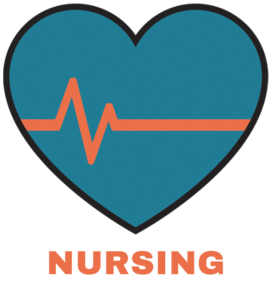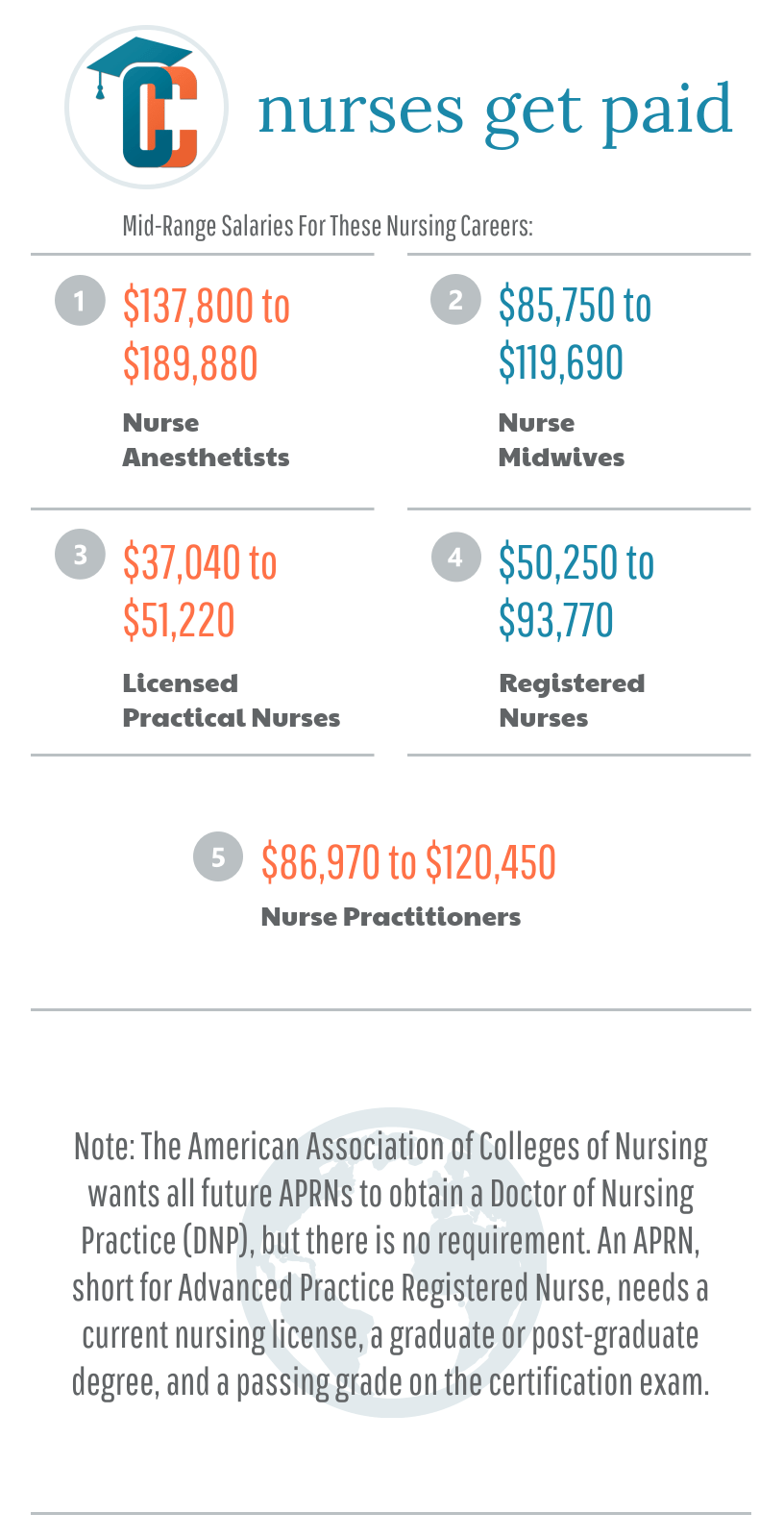CollegeChoice.net is an advertising-supported site. Featured or trusted partner programs and all school search, finder, or match results are for schools that compensate us. This compensation does not influence our school rankings, resource guides, or other editorially-independent information published on this site.
Turn Your Dreams Into Reality
Take our quiz and we'll do the homework for you! Compare your school matches and apply to your top choice today.
Nurses. Save. Lives.

Even though our focuses in hospitals tend to be on the doctors in the white coats, it’s nurses who actually spend the most time with patients and who ensure they get the care that they need.
Nurses do everything from change IV Lines and bedpans, to administering medications and watching out for patients’ allergies. And often times an attentive nurse can provide not only a little extra comfort to a patient in pain, but also saves lives from their close attention to detail.
The importance of this life-changing profession has motivated College Choice to rank the Best Online BSN Degrees!
Sponsored Nursing Programs
Nursing FAQs:
- What Is Nursing?
- What Kinds of Degrees Are Available in Nursing?
- What Are the Requirements for a Career in Nursing?
What do Nurses Do?
Nursing is a critical component of healthcare. Nurses examine patients, record vital signs, and take health histories.
Nurses administer treatments and medication as prescribed by a physician, as well as follow drugs arranged by hospital pharmacists. They assist in labor and delivery, surgery, and breastfeeding. In an emergency, a nurse performs CPR to resuscitate their patient.
These are just some of the tasks a nurse performs, but for many nurses, the job is much more than that. It’s a calling and a way of life. Lives don’t save themselves, and when a patient flatlines or a child is writhing in pain someone needs to be there to help.
These are the roles that nurses fill, and from which they derive much of the motivation for the job.
How Much Money Can You Make If You Study Nursing?
The nursing field is ever-expanding with patient care in high demand. BLS anticipates a fast growth of 19% by 2020. America desperately needs nursing professionals.
However, that doesn’t necessarily mean there are lots of nursing opportunities where you live now. The demand is distributed irregularly throughout the country. Plan now for possible relocation after graduation, because shortages in some states will be acute by 2025.
Becker’s Hospital Review states that Arizona will need over 28,000 more nurses, and North Carolina and Colorado will each be short 13,000 nurses. Meanwhile, Ohio will have 75,000 more nurses than jobs.
In terms of salaries, California, Hawaii, and Oregon have the most well-compensated Registered Nurses, with median salaries above $90,000. And in terms of the cost-salary balance, Nevada, Texas, and Arizona offer the best ratios of average salaries and cost-of-living.
What Kind of Nursing Degrees Are Available?
As the need for nurses rises, so does the demand for a higher quality of care. The Institute of Medicine's Future of Nursing reports initiative for an 80% BSN-educated nurse staff in hospitals by 2020.
Hospitals now prefer or require hiring new nurses that already have this degree, according to the AACN. To prepare you for providing more comprehensive care to patients and advance your career, a RN-to-BSN program is a lucrative option.
An LPN completes a one-year program followed by licensing. Community colleges and technical schools train and educate student nurses through hands-on learning. Students must pass the NCLEX-PN Licensure Examination to become LPNs.
To be a Registered Nurse, some students first obtain an Associate’s degree in Nursing. The Associate program lasts two or three years. They can then take the NCLEX-RN test to become a Registered Nurse.
Some RNs who’ve gone to community college later enroll in an RN to BSN (BS in Nursing) program so they can get their degree, improve their skills, and increase their payment prospects.
Another popular path is to get a BSN from a four-year school and then take the NCLEX-RN.
While RN is a license, BSN is a degree. In addition to knowing that you're saving lives, a BSN also provides ample opportunities for advancement and high paying positions.
Compared to a nursing diploma or an associate's degree in nursing, those with a bachelor's in nursing have a salary of up to about $30,000 more, as Payscale reports.

A third option to consider is an RN to BSN to MSN track or a dual BSN/MSN. MSN stands for Master’s of Science in Nursing.
With an MSN degree, nurses may also obtain certificates to specialize in pediatrics, gerontology, or other units. According to Nurse.org, there are several paths one can take to a satisfying career in nursing.
Note: The American Association of Colleges of Nursing wants all future APRNs to obtain a Doctor of Nursing Practice (DNP), but there is no requirement. An APRN, short for Advanced Practice Registered Nurse, needs a current nursing license, a graduate or post-graduate degree, and a passing grade on the certification exam.
Certification must occur before usage of the APRN designation. An APRN recertifies every two years by taking courses worth 40 CEUs (Continuing Education Units).
The Doctor of Nursing Practice (DNP) degree indicates expertise in the most difficult aspects of nursing. DNPs have the ability to apply their research to improving healthcare facilities and patient care. DNPs have a mean annual salary of $101,260.
Nurse anesthetists complete one year of work experience before admittance to an anesthetist program. The American Midwifery Certification Board licenses Certified Nurse-Midwives (CNMs). Nurse-Midwives recertify in 5-year increments. CNM programs prefer to admit Labor and Delivery nurses.
Nurse Practitioners hold an MSN or DNP, a state license, and certification. Certificates come from many specialty organizations such as the Pediatric Nursing Certification Board. APRNs with a Doctor in Nursing Practice often perform research.
Nurses can also become nursing instructors, another career with a shortage as aging instructors retire. They also go into pharmaceutical sales, medical writing, public policy consulting, and medical supply sales.
Other subfields of nursing include correctional (prisoner) care, telephone triage, forensic nursing, surgical nursing, and dialysis.
What Nursing Specialties Are Available?
Tier one of nursing belongs to Licensed Practical Nurses (LPNs). In some states, they use the title Licensed Vocational Nurse (or LVN). LPNs and LVNs work under the authority of a supervising nurse or physician.
These nurses insert catheters, give patients medication, and chart their patient’s vital signs. LPNs/LVNs tend to wounds and feeding tubes, run intravenous lines, and perform CPR in emergencies.
The median pay for LPNs and LVNs is $44,090. The Bureau of Labor Statistics (BLS) sees 117,300 new jobs for these nurses by 2024. This is 16 percent higher than current staff numbers.
The second tier includes Registered Nurses (RNs). RNs arrange patient care plans, operate medical equipment, and record patient medical histories. They observe their patient and analyze diagnostic tests.
RNs provide instructions on home care after discharge. They perform as a team with the attending physician and other medical staff. Sixty-one percent of RNs work in hospitals.
The BLS anticipates 439,300 new RN positions opening up by 2024. That is a 16 percent increase. Their median salary is $68,450.
Nurse Anesthetists, Nurse-Midwives, and Nurse Practitioners fall under the umbrella term ‘Advanced Practice Registered Nurses’ or APRNs. Certified Nurse-Midwives (CNMs) perform physical examinations, dispense birth control, and treat expecting mothers. They advise women on health, childcare, and pregnancy.
Nurse Practitioners (NPs) act as primary care providers where physicians are in short supply. NPs authorize tests and therapeutic treatments. Nurse Anesthetists administer anesthesia for surgery, childbirth, and other procedures.
APRNs have a median salary of $107,460. There will be 53,400 new jobs by 2024, which is a 31 percent increase.
RN to BSN
BSN
MSN
Nurse Practitioner
DNP
Online College Resources
Helping you prepare and gain the most out of your educational experience.

